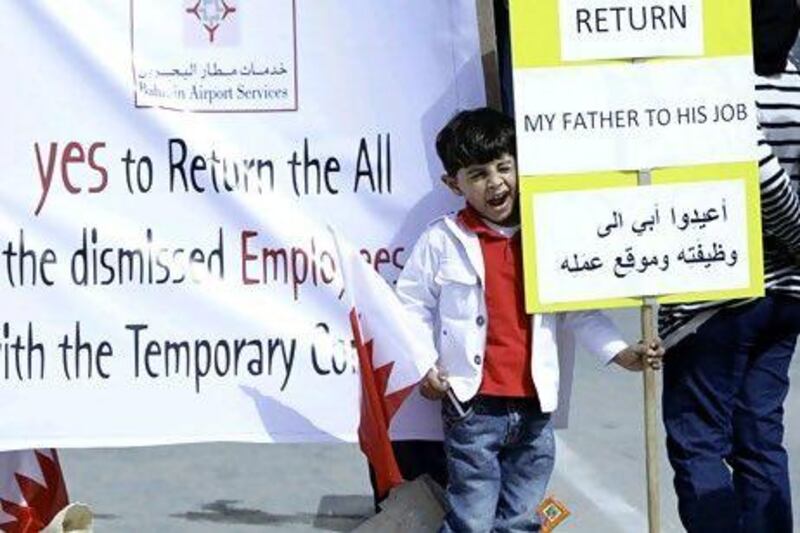A stand-off between Bahrain's trade union movement and the government over labour rights is in danger of stretching into its third year if calls for receiving backdated payments and insurance claims remain unanswered.
Tensions are fraying as the 21-month long stalemate between the Arabian Gulf state's main labour union and the government shows no signs of easing.
At least 4,000 workers have been laid off in Bahrain since last year because of accusations they were involved in illegal strikes.
Most of those who were sacked have now been reinstated but the kingdom's largest trade union, the General Federation of Bahrain Trade Unions (GFBTU), which represents about 25,000 employees from 70 unions, says more needs to be done to compensate workers.
While the government says there is nothing more it can do after dealing with 98 per cent of the cases, the union says labourers have not been paid compensation owed to them covering the period of dismissal.
"The government has not only strived to control a political strike, but industrial strikes too, they don't want us speaking out about anything," said Karim Radhi, the official spokesman for the union.
He estimated that US$5.3 million (Dh19.4m) in backdated payments and insurance claims are still owed to workers covering 10 months of unfair dismissal during last year.
Bahrain's labour situation is more complicated than similar movements in the North African nations of Egypt and Tunisia because of the low tolerance for public demonstrations and strikes. Last week, citing recent episodes of violence and "repeated violations", Bahrain's government banned all public rallies and demonstrations.
The government said it would be prepared to take legal action against anyone attempting to organise a rally.
A senior Bahraini labour ministry official said many of the labour cases have been resolved.
"The matter is now fundamentally resolved," said Sabah Salem Al Dossari, the undersecretary of the labour ministry, in a seven-page emailed statement to The National. "Any remaining issues that arise related to these workers would be handled through the normal applicable laws, procedures and courts."
In the statement, Mr Al Dossari outlined how the government had "successfully resolved some 98 per cent of the almost 5,000 cases of suspensions and dismissal cases that were registered through the government's procedures and in dialogue with the GFBTU.
"This is an extraordinary achievement." But he added that the scope of action available to the government was now "exhausted".
"A small number, less than 1 per cent, have pending court cases or are otherwise unresolved," Mr Al Dossari said, in the statement, adding that only the courts had the legal authority to rule on whether a dismissal was illegal.
The statement did not make reference to any payment plans in place to cover the period of dismissals last year.
Clashes between the Shia-majority and Sunni-led government has hit Bahrain's approximately $28 billion economy. Strikes at big state-run companies including Aluminium Bahrain and Bahrain Petroleum Company have hit production, a key component in the economy.
Economists say calls for increased wages in Gulf states such as Bahrain are realistic in a climate where the standard of living is much more expensive than other countries in the Arab world.
"In the Gulf states, it makes even less sense to compete on a low cost labour basis, where the focus should be on value-added," said Rachel Ziemba, an economist at Roubini Global Economics.
"The capacity for increased innovation in the Gulf Cooperation Council region is high," she said.





